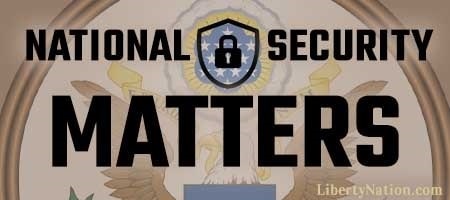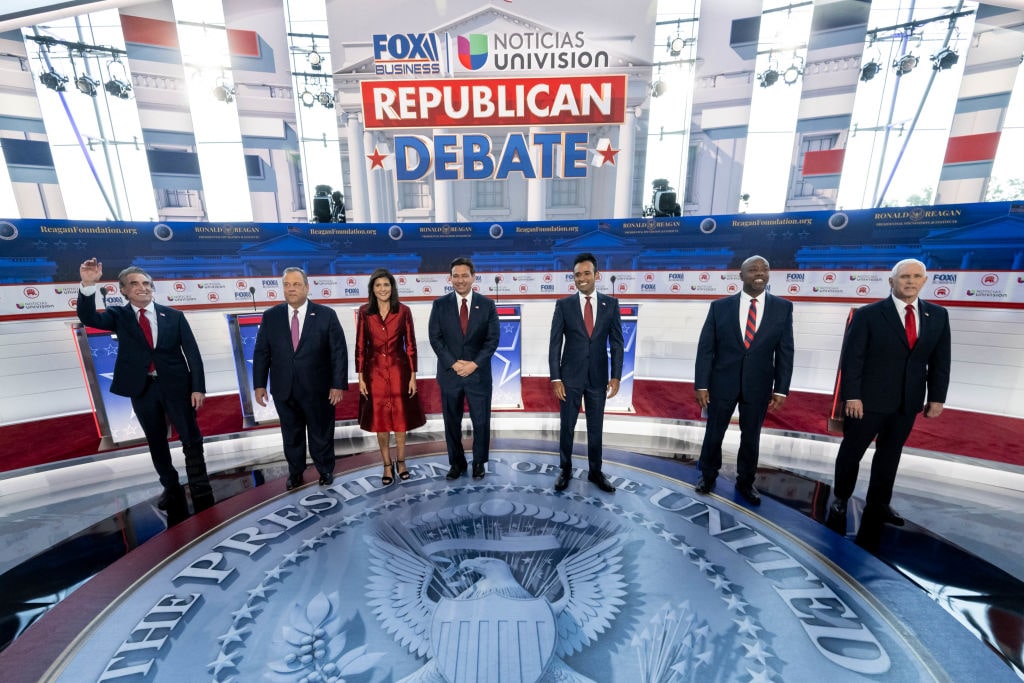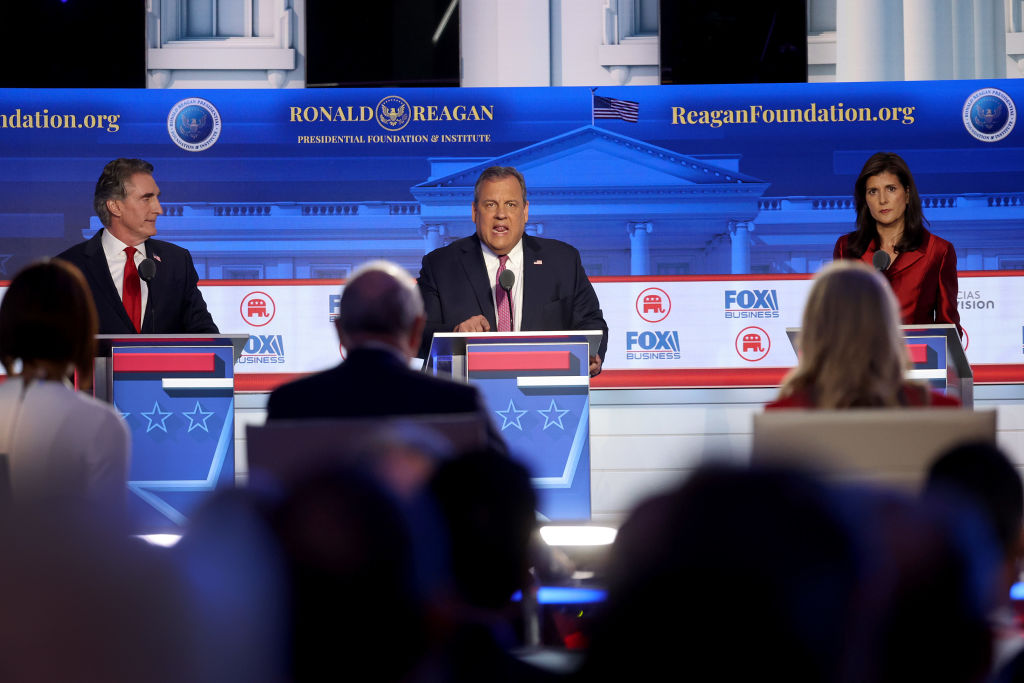Seven Republicans vying for the US presidency took the stage at Simi Valley’s Ronald Reagan Presidential Library for the second GOP debate. As it turned out, the seven were a handful for the moderators, Fox’s Dana Perino and Stuart Varney and Univision’s Ilia Calderón. The candidates took tough questions, but at the end of the night, they failed to move the needle on national security.
Ukraine Crisis Key National Security GOP Debate Topic
The whale in the fishpond question – a nice break, if you will, from the elephant in the room – was what the candidates would do about Russia’s unprovoked invasion of Ukraine. Of the White House competitors lined up on the dais, Florida Governor Ron DeSantis was first to answer on Ukraine. Dana Perino prefaced her question by invoking the venue’s namesake, saying, “President Reagan believed if you want to prevent a war, you better be prepared to fight one.” She explained the Republican Party was at odds over support for Ukraine. The price tag is $76 billion. “Is it in America’s interest to degrade Russia’s military for less than five percent of what we pay annually on defense, especially when there are no US soldiers in the fight?”
“It’s in our interest to end this war, and that’s what I’ll do as president,” the Florida governor said. “We are not going to have a blank check. We will not have US troops. We’re going to make the Europeans do what they need to do. But they’ve sent money to pay bureaucrats’ pensions and salaries and funding small businesses halfway around the world.” Then, DeSantis made the compelling point popular among some of the candidates: While Biden is paying for Kyiv’s bureaucracy, America is being invaded by illegal aliens. “We have got to defend the American people,” he said. “As commander-in-chief I will defend this country’s sovereignty.”
 At that, the stage erupted in a plethora of opinions, with former Governor Nikki Haley shouting her view. “It’s not a territorial dispute. It’s never been a territorial dispute,” she declared, though she never had the chance to explain what “it” is. Senator Tim Scott (R-SC) tried to make the point over the din that the money given to Ukraine is a loan, not a gift. Scott’s point is a hard sell since it sure looks like a gift to most Americans. He pointed out that “our national vital interest is in degrading the Russian military.” Vivek Ramaswamy interrupted, trying to draw an equivalence of evil, saying, “Because Putin is an evil dictator, Ukraine is not good. This is a country that has banned 11 opposition parties.” But whatever his point was, it got lost in the cacophony of voices and an exclamation by former Governor Haley that “A win for Russia is a win for China.” The biotech entrepreneur countered with: “China is the real enemy and we’re driving Russia further into China’s arms.” Mr. Ramaswamy may have missed that Russia is already well-enfolded in Beijing’s fond embrace.
At that, the stage erupted in a plethora of opinions, with former Governor Nikki Haley shouting her view. “It’s not a territorial dispute. It’s never been a territorial dispute,” she declared, though she never had the chance to explain what “it” is. Senator Tim Scott (R-SC) tried to make the point over the din that the money given to Ukraine is a loan, not a gift. Scott’s point is a hard sell since it sure looks like a gift to most Americans. He pointed out that “our national vital interest is in degrading the Russian military.” Vivek Ramaswamy interrupted, trying to draw an equivalence of evil, saying, “Because Putin is an evil dictator, Ukraine is not good. This is a country that has banned 11 opposition parties.” But whatever his point was, it got lost in the cacophony of voices and an exclamation by former Governor Haley that “A win for Russia is a win for China.” The biotech entrepreneur countered with: “China is the real enemy and we’re driving Russia further into China’s arms.” Mr. Ramaswamy may have missed that Russia is already well-enfolded in Beijing’s fond embrace.
Ukraine, Russia, and China: No Consensus
Then, in a commanding voice, former Vice President Mike Pence asserted from the far end of the forum: “Vivek, if you let Putin have Ukraine, that’s a green light to China to take Taiwan. Peace comes through strength.” That assertion lingered in the air for a millisecond and faded. No one was paying attention. While a noisy side debate still raged, Stuart Varney explained that President Biden brought China, Russia, and Iran closer together in the president’s first two years. Varney asked former New Jersey Governor Chris Christie: “Are we focused too much on Ukraine and not enough on this new world order?” Christie replied: “They’re all connected, Stuart. The Chinese are paying for the war in the Ukraine. The Iranians are supplying more sophisticated weapons, and so are the North Koreans, now as well with the encouragement of the Chinese.” The former New Jersey governor asserted the Russian – Chinese alliance is something the US must fight against but didn’t offer a way of doing that. He then suggested the US would not solve the Moscow-Beijing threat by “cuddling up to Vladimir Putin.” No one had said anything about pandering to Putin; it was clearly a talking point Christie had been waiting to stick in somewhere.

(Photo by David Crane, Los Angeles Daily News/SCNG)
Most of the debaters voiced the appropriate amount of enmity for China, Biden’s failure to secure the southern border, and the need to address energy dependence as a national security issue. DeSantis came close to offering a way forward but fell short of a detailed plan. The format for the debate did not allow all the participants to offer points of view on all the subjects. That was unfortunate because, on other topics, North Dakota Governor Doug Burgum had thoughtful, adult responses. His view on Ukraine as a national security issue would have been informative.
With few exceptions, the national security ball was not advanced. The conclusions from the debate were “inevitable,” as Liberty Nation’s Mark Angelides put it. There were no national security “ah ha” moments. What could have been a time for candidates to present their plans on how to solve the Ukraine conflict devolved into a something more akin to children bickering on the playground. The contenders for the leader of the free world did not present a clear and compelling national security way ahead on the debate stage. For now, former President Trump, even in absentia, is the commanding presence.




